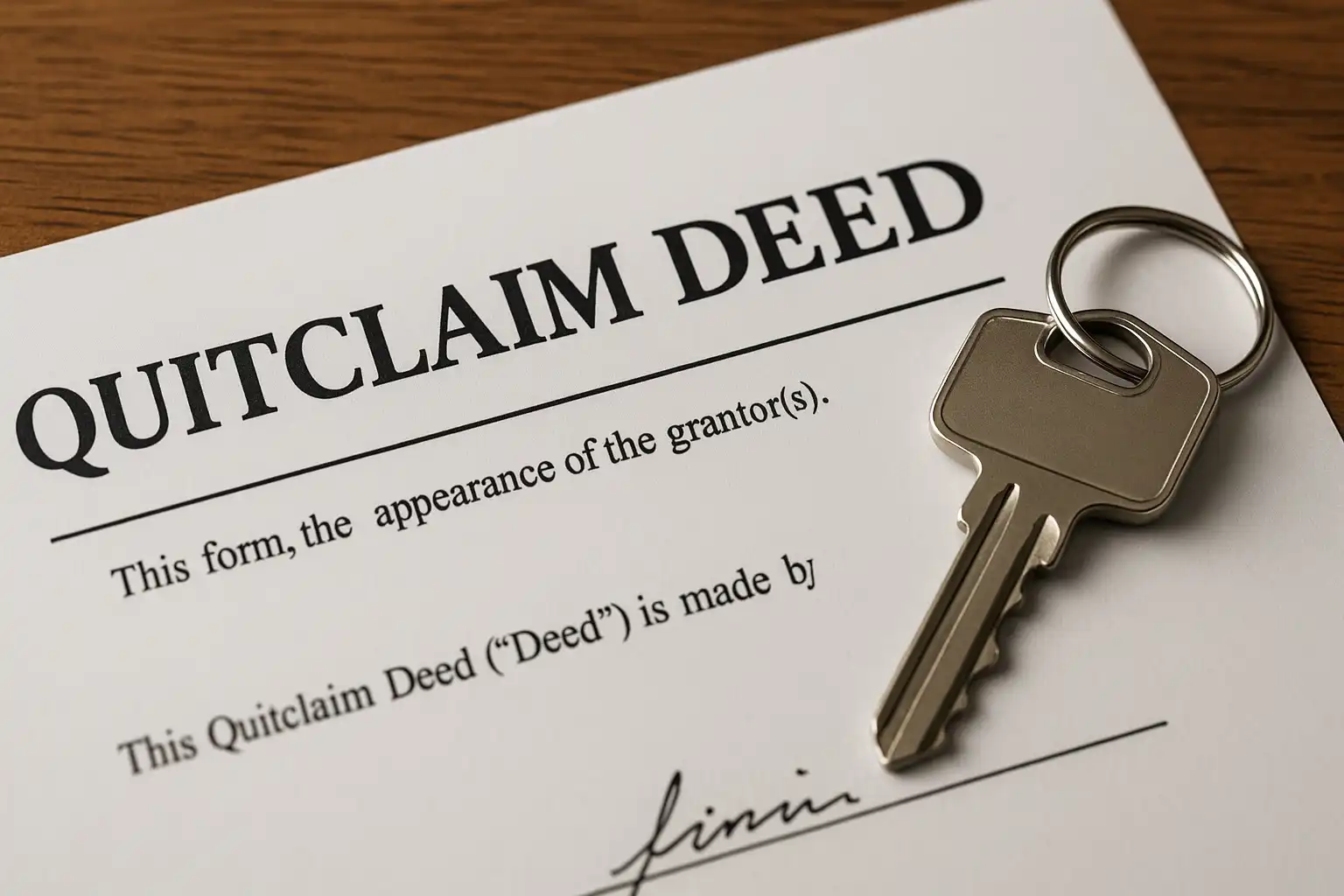
Understanding what quitclaim deeds don’t provide is often more important than understanding what they do. As a real estate attorney, I regularly encounter clients who made costly mistakes because they didn’t fully understand quitclaim deed limitations before accepting these transfers.
Unlike warranty deeds that provide comprehensive protections, quitclaim deeds offer minimal legal safeguards and leave grantees vulnerable to numerous risks. This comprehensive guide examines the critical limitations of quitclaim deeds and helps you understand when these transfers may not provide adequate protection for your interests.
The Fundamental Limitation: No Warranties
The most significant limitation of quitclaim deeds is their complete lack of warranties. When someone gives you a quitclaim deed, they make absolutely no promises about:
Title Quality: The grantor doesn’t guarantee they actually own the property or have the right to transfer it.
Clear Ownership: There’s no assurance that the title is free from competing claims, liens, or other encumbrances.
Legal Authority: The grantor doesn’t warrant they have the legal capacity or authority to make the transfer.
Complete Interest: No guarantee that the grantor is transferring their entire interest or that they own the percentage of the property they claim.
This fundamental lack of warranties creates numerous specific vulnerabilities that can have serious financial and legal consequences.
Hidden Liens and Encumbrances
Quitclaim deeds provide no protection against existing liens or encumbrances that may be attached to the property.
Types of Hidden Liens
Judgment Liens: Previous owners may have had court judgments entered against them, creating liens that remain attached to the property regardless of ownership changes.
Tax Liens: Federal, state, or local tax authorities may have placed liens on the property for unpaid taxes. These liens typically remain with the property until satisfied.
Mechanic’s Liens: Contractors, subcontractors, or suppliers who performed work on the property may have filed liens for unpaid services or materials.
HOA Liens: Homeowners associations may have placed liens for unpaid association fees, special assessments, or rule violations.
Utility Liens: Some jurisdictions allow utility companies to place liens for unpaid services, which may not appear in standard title searches.
Real-World Example
A client purchased property from a family member using a quitclaim deed. Six months later, a contractor filed a lawsuit claiming the previous owner owed $25,000 for roof repairs. Because the work was completed before the transfer but the lien was filed after, my client became responsible for resolving the debt to clear the title.
Protection Strategies
Comprehensive title search: Even for family transfers, consider professional title examination.
Lien searches: Check for recorded and unrecorded liens through multiple sources.
Title insurance: Obtain coverage when possible, though many insurers are reluctant to cover quitclaim deed transfers.
Mortgage Complications and Liability
Quitclaim deeds create significant complications regarding existing mortgages that many people don’t anticipate.
Mortgage Liability Continues
Original borrower responsibility: Signing a quitclaim deed doesn’t remove the original borrower from mortgage liability. They remain legally responsible for loan payments even after transferring ownership.
Credit implications: If the new owner stops making payments, the original borrower’s credit will be damaged, and they face foreclosure liability.
Lender rights: Mortgage lenders retain all rights against the original borrower regardless of property ownership changes.
Due-on-Sale Clause Risks
Automatic acceleration: Most mortgages include due-on-sale clauses that allow lenders to demand immediate full payment when ownership transfers.
Enforcement variations: While lenders rarely enforce these clauses for family transfers, they retain the legal right to do so.
Refinancing requirements: New owners often cannot qualify for loan assumptions, forcing expensive refinancing or creating default situations.
Real-World Consequences
A divorced couple used quitclaim deeds to transfer the family home to the wife. Two years later, when she couldn’t make payments, the bank foreclosed on the property and pursued the ex-husband for the remaining loan balance, despite his having no ownership interest.
Fraudulent or Invalid Transfers
Quitclaim deeds offer no protection against fraudulent or invalid transfers that may have occurred in the property’s history.
Common Fraud Scenarios
Forged signatures: Previous transfers may have involved forged signatures from owners who never consented to the transfers.
Identity theft: Criminals may have stolen identities to execute false transfers, creating competing ownership claims.
Incapacity transfers: Transfers from individuals who lacked legal capacity due to mental illness, dementia, or other conditions may be invalid.
Unauthorized agent transfers: Powers of attorney may have been misused to execute transfers without proper authorization.
Chain of Title Problems
Missing links: Important transfers in the property’s ownership history may be missing or improperly recorded.
Competing claims: Multiple parties may have valid claims to the same property based on different transfer documents.
Recording errors: Mistakes in public records may create confusion about true ownership.
Legal Vulnerabilities
Unlike warranty deeds that provide legal recourse against grantors for title defects, quitclaim deed recipients have no warranty protection against fraud or invalid transfers. If someone challenges your ownership based on fraud in the chain of title, you bear the full cost and risk of defending your ownership rights.
Inheritance and Estate Issues
Quitclaim deeds provide no protection against inheritance-related title problems that can emerge years after transfers.
Probate Complications
Improper estate transfers: Property may have been transferred without proper probate proceedings, creating invalid transfers.
Missing heirs: Unknown or overlooked heirs may later claim ownership rights based on inheritance laws.
Will contests: Successful challenges to wills may invalidate property transfers made pursuant to those documents.
Community property issues: In community property states, transfers may be invalid if they didn’t include required spousal consents.
Real-World Example
A client received property via quitclaim deed from an uncle. Three years later, distant cousins successfully challenged the uncle’s will, proving he lacked capacity when he executed it. The court invalidated the will, and my client lost the property to the rightful heirs.
Time Limitations
Statute of limitations: While some title challenges face time limitations, inheritance disputes often have extended or no time limits.
Discovery rules: Time limits may not begin until unknown heirs discover the transfers, potentially occurring decades later.
Boundary and Survey Disputes
Quitclaim deeds provide no protection against boundary disputes or survey-related problems.
Common Boundary Issues
Incorrect legal descriptions: Property descriptions in quitclaim deeds may not accurately reflect actual boundaries.
Encroachments: Neighboring properties may encroach on the transferred property, reducing its usable area.
Easement problems: Undisclosed easements may give others rights to use portions of the property.
Access issues: Properties may lack legal access to public roads, creating landlocked situations.
Survey Complications
Conflicting surveys: Different surveys may show varying boundary lines, creating uncertainty about actual property limits.
Monument problems: Survey markers may be missing, moved, or incorrectly placed.
Measurement errors: Mistakes in historical surveys may create overlapping property claims.
Financial Consequences
Boundary disputes can result in:
- Expensive legal proceedings to establish correct boundaries
- Loss of property area if boundaries are determined to be different than expected
- Inability to develop or use property as intended
- Reduced property values due to boundary uncertainties
Environmental Hazards and Contamination
Quitclaim deeds offer no protection against environmental problems that may affect the property.
Hidden Environmental Issues
Soil contamination: Previous uses may have contaminated soil with hazardous substances.
Underground storage tanks: Abandoned fuel tanks or chemical storage may create environmental liability.
Asbestos and lead: Older properties may contain hazardous materials requiring expensive remediation.
Wetlands designations: Environmental regulations may restrict property use or development.
Liability Concerns
Cleanup costs: Property owners may become responsible for expensive environmental remediation regardless of when contamination occurred.
Regulatory compliance: Environmental agencies may require current owners to address violations created by previous owners.
Third-party claims: Neighbors or other parties may seek damages for environmental problems originating from the property.
Due Diligence Limitations
Unlike commercial real estate transactions that typically include environmental assessments, quitclaim deed transfers rarely involve environmental due diligence, leaving new owners vulnerable to unexpected environmental liability.
Title Insurance Limitations
Standard title insurance policies provide limited or no coverage for properties acquired through quitclaim deeds.
Coverage Restrictions
Exclusions: Title insurance companies often exclude coverage for defects that could have been discovered through proper due diligence.
Limited policies: When coverage is available, it may exclude many types of title problems commonly associated with quitclaim deed transfers.
Higher premiums: Insurance companies charge significantly higher premiums for quitclaim deed coverage due to increased risks.
Alternative Coverage Options
Quiet title actions: Legal proceedings to establish clear ownership, though expensive and time-consuming.
Enhanced title searches: More comprehensive examination of title history, though still limited in scope.
Legal opinions: Attorney opinions about title quality, though these don’t provide insurance coverage.
Financial and Tax Implications
Quitclaim deeds can create unexpected financial and tax consequences that other deed types help avoid.
Gift Tax Issues
IRS reporting requirements: Transfers for less than fair market value may trigger gift tax reporting obligations under IRS regulations.
Valuation problems: Determining fair market value for gift tax purposes can be complex and expensive.
Generation-skipping taxes: Transfers to grandchildren or others may trigger additional federal taxes.
Property Tax Complications
Reassessment triggers: Property transfers may cause property tax reassessments, significantly increasing annual tax obligations.
Exemption losses: Seniors or disabled property owners may lose valuable property tax exemptions when transferring ownership.
Transfer taxes: State and local transfer taxes may apply even to gift transfers between family members.
Capital Gains Considerations
Basis step-up loss: Inherited property receives a “stepped-up basis” for tax purposes, while gifted property retains the original owner’s tax basis.
Depreciation recapture: Investment properties may trigger depreciation recapture taxes upon transfer.
Installment sale complications: Quitclaim deeds may interfere with installment sale tax treatment.
Legal Recourse Limitations
Perhaps the most significant limitation of quitclaim deeds is the lack of legal recourse when problems arise.
No Warranty Claims
Breach of warranty: Unlike warranty deeds, quitclaim deeds provide no warranties to breach when title problems emerge.
Grantor protection: Grantors who provide quitclaim deeds face minimal legal liability for title defects or problems.
Limited damages: Even when legal claims are possible, damage remedies may be limited or unavailable.
Burden of Proof
Title challenges: Quitclaim deed recipients bear the full burden of proving their ownership rights when challenged.
Defense costs: All costs of defending title challenges fall on the property owner, with no recourse against the grantor.
Expert witnesses: Title disputes often require expensive expert testimony and legal proceedings.
Time and Cost Factors
Lengthy proceedings: Title disputes can take years to resolve through the court system.
Attorney fees: Legal costs for title defense can easily exceed property values in some cases.
Uncertain outcomes: Court decisions in title disputes are not guaranteed to favor the current owner.
When Quitclaim Deed Limitations Become Critical
Understanding when quitclaim deed limitations create unacceptable risks helps inform transfer decisions.
High-Risk Situations
Unknown title history: Properties with unclear or complex ownership histories present elevated risks.
Investment properties: Commercial or rental properties require maximum title protection due to higher financial stakes.
Arm’s length transactions: Transfers between strangers or business parties need comprehensive protections.
Distressed properties: Foreclosures, tax sales, or financially troubled transfers carry heightened risks.
Moderate-Risk Scenarios
Family transfers: Even trusted family transfers can involve unexpected risks, particularly with inherited properties.
Divorce settlements: Emotional situations may overlook important title protection considerations.
Estate planning: Trust transfers and estate gifts require careful analysis of long-term implications.
Lower-Risk Applications
Title corrections: Simple name corrections or minor title fixes typically involve minimal risks.
Spousal additions: Adding spouses to clearly owned marital property usually presents lower risks.
Known property histories: Properties with well-documented, clean title histories face fewer potential problems.
Alternatives That Provide Better Protection
When quitclaim deed limitations create unacceptable risks, alternative transfer methods offer better protection.
Warranty Deeds
Full protection: General warranty deeds provide comprehensive protection against all title defects.
Legal recourse: Warranty deed recipients can sue grantors for breach of warranty when problems arise.
Title insurance: Warranty deeds typically qualify for standard title insurance coverage.
Special Warranty Deeds
Limited protection: Special warranty deeds protect against defects created during the grantor’s ownership period.
Reduced liability: Grantors face limited liability compared to general warranty deeds.
Middle ground: Provides more protection than quitclaim deeds while limiting grantor exposure.
Title Insurance
Comprehensive coverage: Title insurance policies protect against most title defects and provide legal defense.
Financial protection: Insurance companies pay claims and legal costs for covered title problems.
Professional examination: Title insurance requires professional title examination before coverage.
Professional Consultation Recommendations
Given the significant limitations of quitclaim deeds, professional consultation is often essential.
Real Estate Attorney Consultation
Risk assessment: Attorneys can evaluate specific situations and recommend appropriate transfer methods.
Title examination: Legal professionals can conduct comprehensive title analysis to identify potential problems.
Alternative structuring: Lawyers can suggest alternative transfer methods that provide better protection.
Title Company Services
Professional title searches: Title companies provide comprehensive examination of property ownership history.
Insurance options: Title companies can explain available insurance coverage and limitations.
Recording services: Professional recording ensures proper document preparation and filing.
Tax Professional Advice
Tax implications: CPAs and tax attorneys can explain tax consequences of different transfer methods.
Planning strategies: Tax professionals can recommend timing and structuring options to minimize tax impact.
Compliance requirements: Tax experts ensure compliance with federal and state reporting requirements.
Making Informed Decisions
Understanding quitclaim deed limitations helps property owners make informed decisions about transfer methods.
Risk Assessment Questions
Before accepting a quitclaim deed, consider:
- How well do I know the grantor’s credibility and the property’s history?
- What are the potential financial consequences if title problems arise?
- Do I have adequate resources to defend against title challenges?
- Are alternative transfer methods available that provide better protection?
- Have I consulted with qualified professionals about the risks involved?
Cost-Benefit Analysis
Immediate costs: Quitclaim deeds typically involve lower immediate costs than warranty deeds or title insurance.
Long-term risks: Potential costs of title problems may far exceed the savings from choosing quitclaim deeds.
Risk tolerance: Consider your financial ability to absorb potential losses from title defects.
Alternative costs: Compare quitclaim deed risks with the costs of obtaining better protection through warranty deeds or title insurance.
Conclusion
Quitclaim deeds serve important purposes in specific situations, but their limitations make them inappropriate for many property transfers. Understanding what quitclaim deeds don’t protect you from is essential for making informed decisions about property ownership and transfer methods.
The lack of warranties, absence of title protection, mortgage complications, and limited legal recourse create significant risks that may not be apparent until serious problems emerge. These limitations make quitclaim deeds suitable primarily for transfers between trusted parties involving properties with well-known histories and minimal risk factors.
For transactions involving substantial value, unknown parties, or uncertain title histories, warranty deeds and title insurance provide essential protections that quitclaim deeds cannot offer. The additional costs of these protections are typically minimal compared to the potential financial consequences of title problems.
When considering any property transfer, carefully evaluate the limitations of quitclaim deeds against your specific situation and risk tolerance. Professional consultation with real estate attorneys, title companies, and tax advisors can help ensure you choose transfer methods that provide appropriate protection for your circumstances and financial interests.
Remember that property ownership represents significant financial value and legal rights. Protecting these interests through appropriate transfer methods and professional guidance is typically a wise investment in your financial security and peace of mind.
Sources:
- American Bar Association. “Real Property Transfer Guidelines.” ABA.org
- National Association of Realtors. “Deed Types and Property Transfer Best Practices.” NAR.org
- Internal Revenue Service. “Gift Tax Implications of Property Transfers.” IRS.gov
This guide provides general information about quitclaim deed limitations and should not be considered legal advice. Property laws vary by state, and specific situations may require consultation with qualified real estate attorneys and other professionals.


Leave a Reply